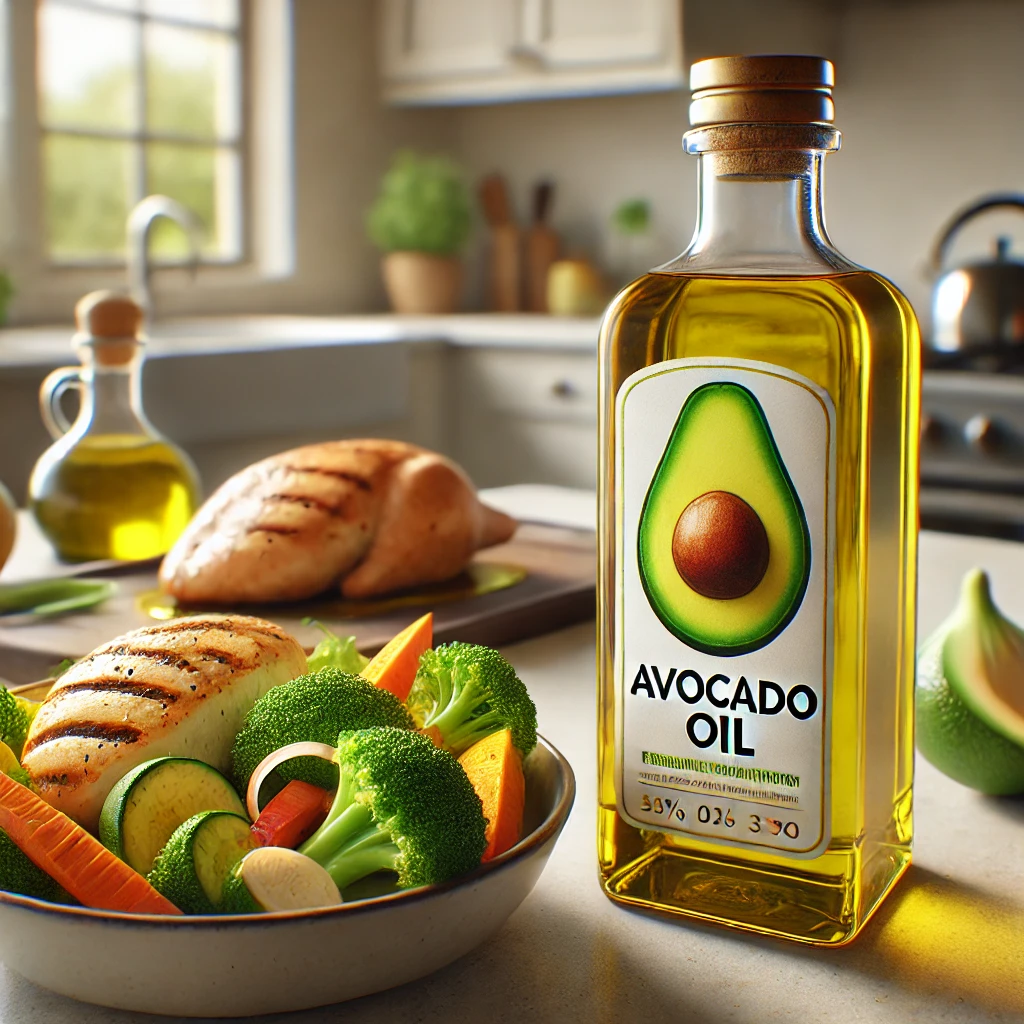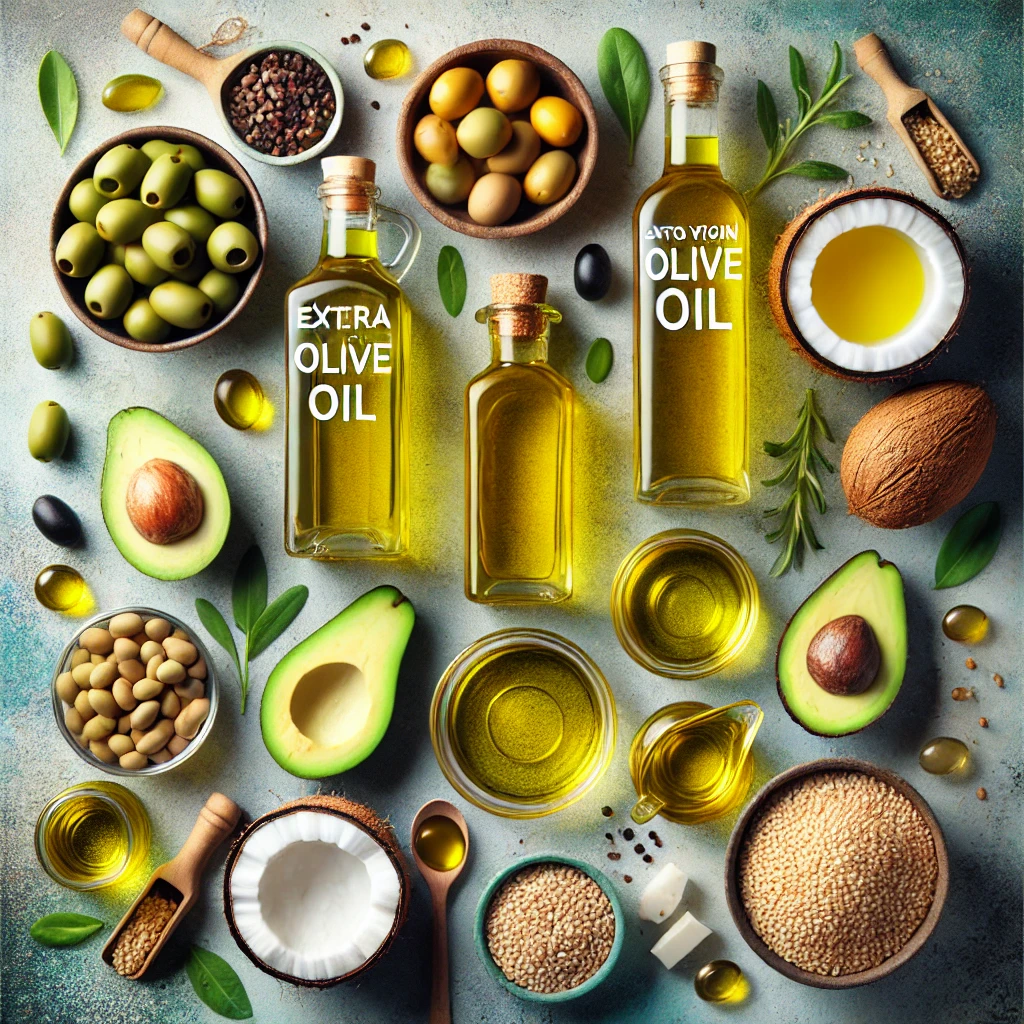Cooking oils are essential in every kitchen, but choosing the right one can have a significant impact on both the flavor of your dishes and your health. Some oils are better suited for high-heat frying, while others shine as dressings or finishing oils. In this guide, we’ll cover the five healthiest oils for cooking, exploring their nutritional benefits, best uses, and smoking points.
Whether you’re sautéing, baking, or frying, these oils offer versatility, flavor, and health benefits, making them excellent choices for any home cook.
1. Extra Virgin Olive Oil (EVOO)
Often hailed as the gold standard for healthy cooking, extra virgin olive oil is a staple of the Mediterranean diet and a favorite among health enthusiasts. Its rich flavor and nutrient profile make it a versatile choice for a variety of dishes.
- Smoking Point: 374–405°F (190–207°C)
- Best Uses: Sautéing, low-heat cooking, drizzling, dressings
Nutritional Highlights
- High in monounsaturated fats, which reduce bad cholesterol and promote heart health.
- Rich in antioxidants like polyphenols and vitamin E, which combat inflammation and oxidative stress.
- Linked to a reduced risk of chronic diseases, including heart disease, type 2 diabetes, and certain cancers.
Cooking Tips
EVOO’s relatively low smoking point makes it ideal for light sautéing, drizzling over salads, or finishing roasted vegetables. Avoid using it for deep frying.
Additional Benefits
It’s also known to improve joint health, support brain function, and enhance skin elasticity.

2. Avocado Oil
Avocado oil is full of nutrients and the best for high-heat cooking. Its light, buttery flavor makes it a favorite for both culinary and health purposes, providing a perfect balance of taste and functionality.
- Smoking Point: 480–520°F (249–271°C)
- Best Uses: High-heat cooking, grilling, frying, roasting, and baking
Nutritional Highlights
- Rich in monounsaturated fats, which lower cholesterol and promote heart health.
- Packed with the antioxidant lutein, which promotes eye health.
- Provides vitamin E, which boosts skin health and strengthens the immune system.
Cooking Tips
Thanks to its high smoking point, avocado oil is perfect for frying, roasting vegetables, or searing meats. Its mild flavor ensures it doesn’t overpower dishes, making it ideal for both sweet and savory recipes.
Additional Benefits
Research suggests avocado oil helps improve nutrient absorption, especially fat-soluble vitamins (A, D, E, K), and supports a healthy digestive system.

3. Coconut Oil
Known for its versatility in the kitchen and beyond, coconut oil offers unique benefits thanks to its medium-chain triglycerides (MCTs). Its slightly sweet, tropical flavor makes it ideal for baking and sautéing.
- Smoking Point: 350°F (177°C) for unrefined, 450°F (232°C) for refined
- Best Uses: Baking, sautéing, curries, and medium-heat cooking
Nutritional Highlights
- Contains MCTs, which provide quick energy and are easily digestible.
- Offers antimicrobial properties due to lauric acid, promoting gut and immune health.
- Supports brain function and is often used in keto and low-carb diets.
Cooking Tips
Refined coconut oil is suitable for high-heat cooking, while unrefined (virgin) coconut oil adds a subtle coconut flavor, perfect for baked goods and curries.
Additional Benefits
It doubles as a skincare and haircare product, thanks to its hydrating and nourishing properties

4. Canola Oil
As one of the most commonly used oils worldwide, canola oil is a reliable and affordable choice. It boasts a neutral flavor and a balanced nutritional profile, making it an essential all-purpose oil.
- Smoking Point: 400°F (204°C)
- Best Uses: Frying, grilling, stir-frying, and baking
Nutritional Highlights
- Low in saturated fats and high in heart-healthy omega-3 fatty acids.
- Contains plant sterols, which help lower cholesterol levels.
- Offers a balanced ratio of omega-6 to omega-3 fatty acids, reducing inflammation.
Cooking Tips
Canola oil’s neutral flavor makes it ideal for frying foods, grilling, or baking desserts. It’s also budget-friendly, making it perfect for everyday cooking.
Additional Benefits
Canola oil’s omega-3 content makes it a heart-healthy choice, and its versatility ensures it works for nearly any recipe.

5. Sesame Oil
Beloved for its nutty aroma and distinct flavor, sesame oil is a culinary staple in Asian and Middle Eastern cuisines. This oil is as flavorful as it is nutritious, adding a unique flair to dishes.
- Smoking Point: 410°F (210°C)
- Best Uses: Stir-fries, marinades, sauces, and as a finishing oil
Additional Benefits
- High in antioxidants such as sesamol and sesamin, which protect cells from oxidative stress.
- Contains zinc and copper, essential for immune function and skin repair.
- Supports hormonal balance due to its natural lignans.
Cooking Tips
Light sesame oil is excellent for cooking, while toasted sesame oil should be used as a finishing touch for salads, stir-fries, and marinades.
Additional Benefits
Its anti-inflammatory properties make it beneficial for joint health, and it’s also a great oil for skin hydration.

Conclusion
Selecting the right oil for cooking not only enhances the flavor of your dishes but also supports your health. While extra virgin olive oil and avocado oil are perfect for their heart-healthy fats, coconut oil offers quick energy, and sesame oil brings unique flavors and antioxidants to your meals. Canola oil, with its affordability and versatility, remains a kitchen staple.
To make the most of these oils, pair them with quick and nutritious recipes. Check out our guide on Healthy Meal Ideas Under 30 Minutes for delicious dishes you can whip up in no time, using these oils to their full potential!
Experiment with these options to discover the perfect fit for your cooking style and enjoy the health benefits of these healthy oils for cooking in your daily meals.



